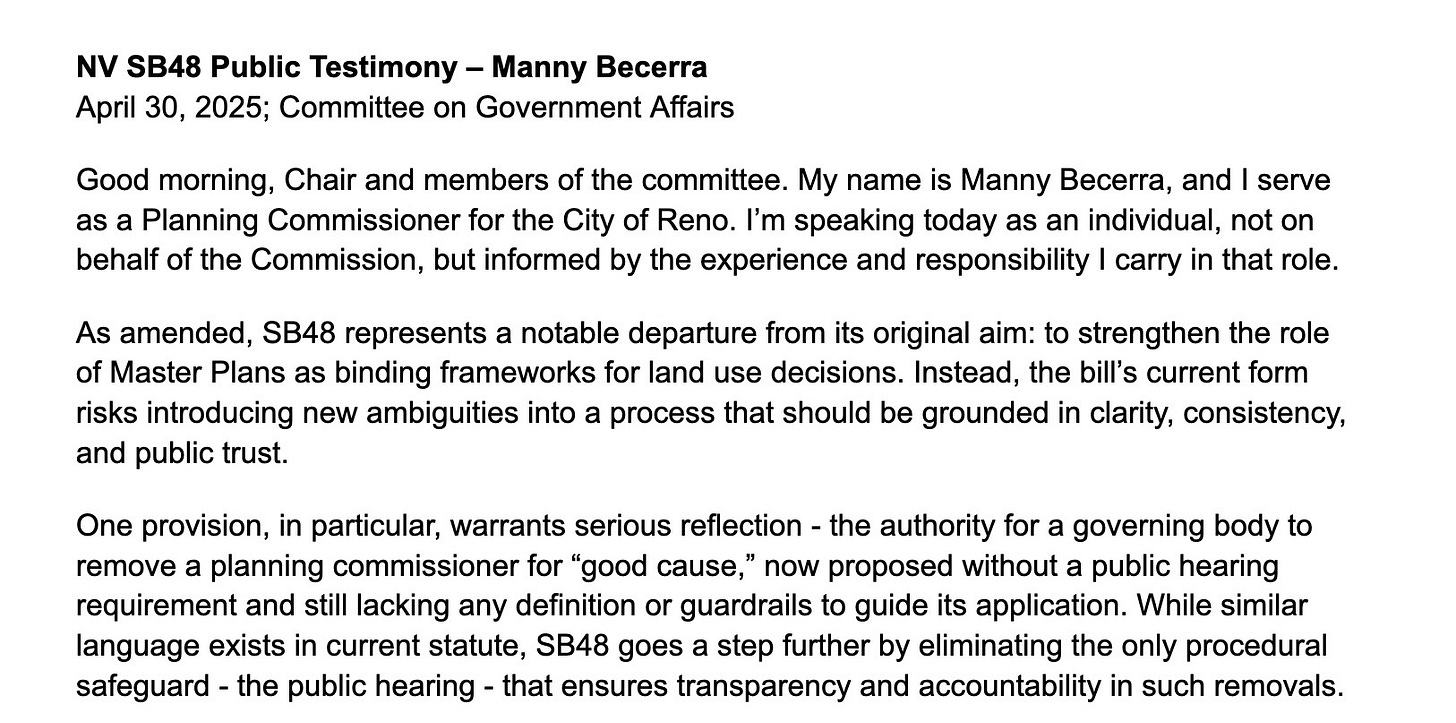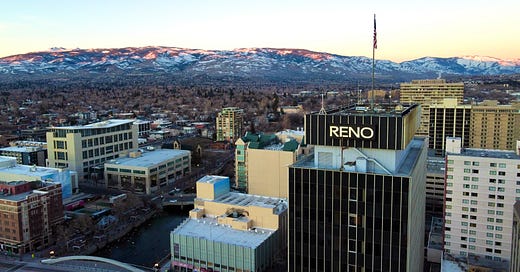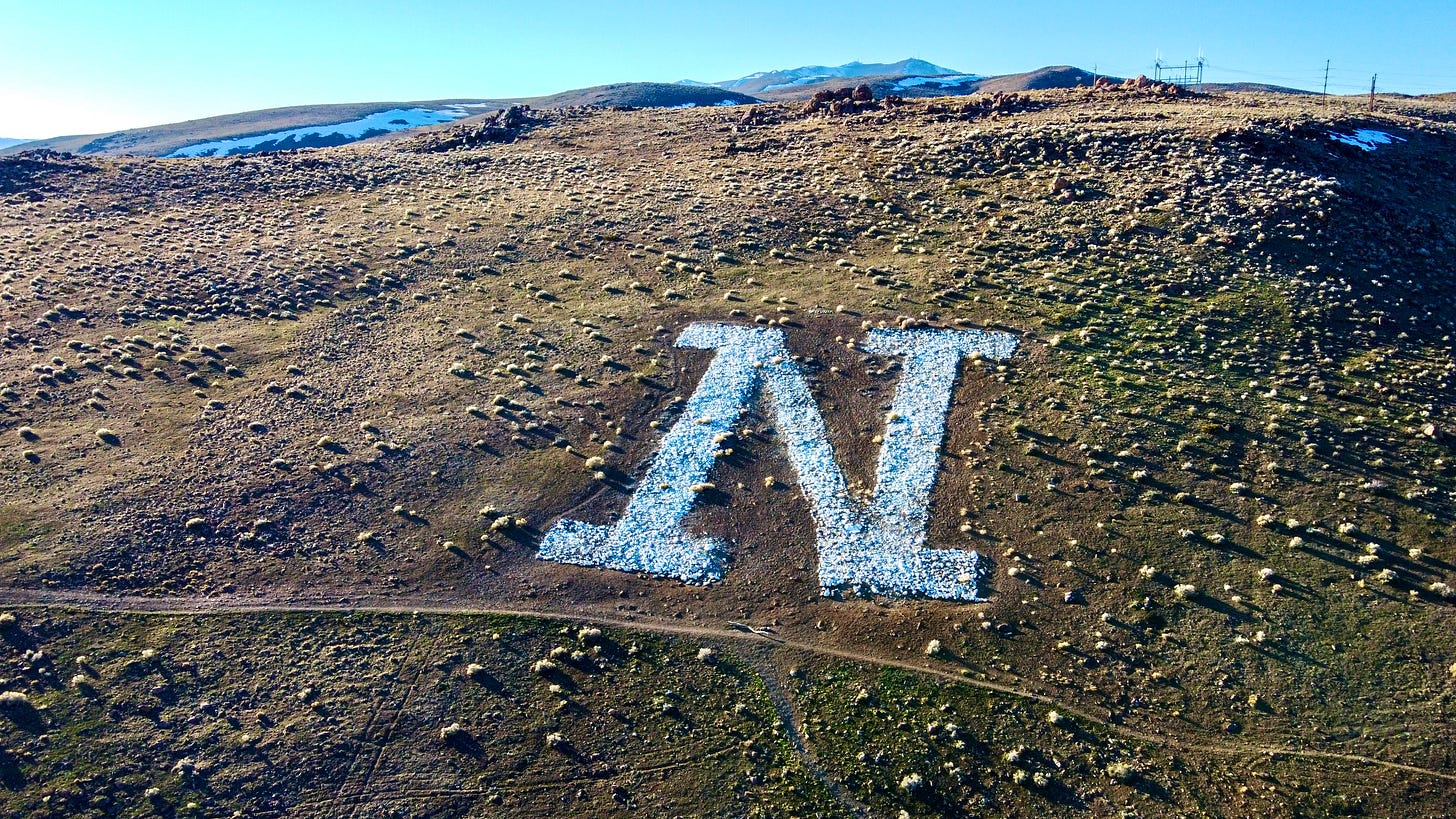Building Smarter: A Shared Path Forward on Data Centers and Reno
Advancing Growth That’s Business-Friendly and Resident-Responsible
TL;DR: Reno’s approach to data centers is at a crossroads. With a long-delayed joint meeting now set for July and transparency issues surfacing through SB48, we need clear public frameworks - not political shortcuts. At the same time, regional leadership is beginning to lay important groundwork, with new motions passed to study and track data center impacts across jurisdictions. This post explores where things stand, what’s at stake, and how residents, businesses, and city leadership can continue to help shape a smarter, fairer path forward.
Setting the Stage for What Comes Next
When Policy Quietly Shifts
Since publishing my post, Shaping Reno’s Future: A Balanced Approach to Data Centers, the conversation has evolved - and so has the urgency. This follow-up was originally intended for late April, but just as I prepared to share it, information emerged that the City of Reno had quietly moved to sponsor Senate Bill 48 - a state bill that began with constructive intent from the City of Las Vegas, but was later gutted and rewritten by the City of Reno. The result blurs procedural tweaks with potentially serious consequences.
As amended, SB48 would have allowed City Council to remove Planning Commissioners at will - without a public hearing or even a stated reason - relying instead on a vague standard of “just cause,” absent any defined criteria or procedural safeguards. Appointments made in public, like those to the Planning Commission, should not be quietly undone in private. Accountability is a continuous, participatory process - and the public deserves confidence that commissioners are evaluating land use proposals based on expertise, context, and community input, not political allegiance. Undermining that balance erodes transparency and risks politicizing a body intended to serve the public interest, not reflect shifting council dynamics.

Why Transparency Still Matters
Though a few of us testified against SB48 in our personal capacities, its intent and timing are deeply concerning - not because it impacts us as individuals, but because it signals a broader shift away from civic transparency and institutional balance. It also casts a shadow over the work ahead - including a critically important issue now before us: the responsible development of data centers and the need for a clear, public-facing framework to guide them.
Joint Meeting on Data Centers
Framing the Moment
As we anticipate the long-awaited joint meeting between the Planning Commission and City Council - recently delayed again, now to July - it’s important to clarify that while the meeting itself isn’t a formal policy milestone, it could serve as a critical step toward shaping one. In the absence of direction from City Council or staff, I and others have continued to frame this session as an opportunity for education, discovery, and constructive dialogue. It’s a chance to bring Council, Commissioners, the public, and private-sector voices together in pursuit of shared understanding and forward-looking solutions.
The Risk of Delay
But continued delays don’t just stall sensible policy for residents and industry - they postpone meaningful public engagement on a time-sensitive issue. Whether this meeting becomes a platform for genuine collaboration or a missed opportunity depends on how we show up - and whether we demand better.
Reno’s growth must strive to be both business- and industry-friendly and community-focused and resident-responsible - a balance we’ve yet to fully strike, but one that calls for intentional leadership to achieve. Above all, our decisions should reflect not just short-term wins, but long-term values. That means honoring the Reno Master Plan and regional goals - not as static documents, but as adaptable, community-informed frameworks designed to evolve with the times while safeguarding the public interest. These principles aren’t at odds - they’re the foundation of thoughtful leadership.
My aim is to help ensure this joint meeting becomes more than a symbolic gesture - that it lays the groundwork for a thoughtful, transparent path forward. With so much uncertainty around what’s currently being prioritized, clarity will only come through continued engagement. I’ll keep doing my part to help shape that process - and I invite you, as a resident, business leader, or stakeholder, to stay involved and share your voice in shaping it.
Advancing the Regional Conversation on Data Centers
Motions adopted by the Regional Planning Commission
Earlier this year, with strong support from fellow commissioners, I introduced two motions at the Regional Planning Commission aimed at bringing greater clarity and consistency to how data centers are tracked and assessed at the regional level. The first (January 2025) directed staff to monitor data center requests and approvals across jurisdictions and to research how such projects may trigger regional review under existing land use policies. The second (March 2025) accepted the staff’s initial findings and formally incorporated this work into regional staff’s Strategic Work Plan.
Both motions passed unanimously and reflect a shared commitment across the commission to anticipate growth thoughtfully, align economic opportunity with public interest, and ensure our regional planning efforts are proactive, not reactive. As Reno and the region continue navigating these complex decisions, that kind of coordination will be more important than ever.


With that, let’s dive in…
A Moment of Opportunity
A quick reminder: Back in February, the Planning Commission brought forward a proposal to temporarily pause new data center permits while the City Council directed staff to develop a clear, time-certain framework for evaluating them. The City Council ultimately did not support the resolution, resulting in a 3-3 tie.

Weeks later, a joint meeting was proposed - though without a clearly defined purpose or timeline. Now slated for July, it’s been several months of delay, adding to the understandable frustration of residents, private-sector stakeholders, and nonprofit partners who’ve remained engaged in good faith and eager to contribute throughout the process.
Done right, this meeting can still deliver on its potential:
Educate - about the data center industry, its community and environmental impacts, and how other cities are addressing similar challenges.
Engage - by creating space for a cross-section of voices: developers, engineers, policy leaders, environmental experts, and everyday residents.
Establish - a thoughtful, forward-looking policy direction from Council for staff to craft a comprehensive framework that benefits Reno’s economy and people alike.
This moment calls for balance - for leadership that’s forward-thinking yet grounded in shared values and a thriving vision we can all get behind.
Financial Stewardship and Civic Responsibility
A fiscally responsible city isn’t just open for business - it ensures that doing business here meaningfully contributes to the public good.
Recent national reporting has raised red flags about how massive tax breaks for data centers, particularly those powering AI, may generate limited returns for host communities. As TIME Magazine recently noted, while these projects often promise long-term economic growth, they tend to produce few permanent jobs and significant demands on infrastructure, energy, and water. Similarly, The New York Times highlighted how the rise of AI-driven data centers is rapidly reshaping land use and utility demands, often without a clear plan for how those impacts will be mitigated locally. Without clear local frameworks in place, cities can find themselves on the losing end of deals designed more for national headlines than community benefit.
Being business-friendly and community-responsible aren’t opposing goals - they’re two sides of sustainable growth, fiscal health and shared quality of life. We can and must align them.
A Smarter, Shared Approach
Progress starts when we listen to one another - and it endures when we act with shared purpose. That includes integrating best practices and tools such as:
Community Benefit Agreements (CBAs) - ensuring major projects generate lasting value for local residents.
Site sensitivity and infrastructure compatibility - as recommended by the Urban Land Institute, including proximity to critical infrastructure and compatibility with surrounding land use.
Resilient, water- and energy-conscious design - reflecting both our desert climate and our long-term sustainability goals.
Clear and transparent zoning and review standards - so applicants, residents and planners share aligned expectations from the outset.
This isn’t about adding barriers. It’s about creating clarity - for applicants, residents and decision-makers alike, so that good projects can move forward more smoothly. In fact, if done right, this clarity can actually reduce friction, e.g. “red tape”, and create more predictability for everyone involved.
Keep the Public Process Strong
Civic engagement shouldn’t be reserved for final votes - it should shape the path we take to get there.
As Alicia Barber reminded us at the start of the year, 2025 should be the year of the people — not just in sentiment, but in how we design and uphold civic processes. True engagement means inviting the public in early, equipping them to participate meaningfully, and honoring their voices in the decisions that follow. Her latest post, “What does ‘Community Engagement’ mean to you?”, is a timely read - and a useful guidepost for us all.
That’s why reaffirming the role of local residents and stakeholders in shaping Reno’s future - not as an afterthought, but as a foundation - is more important than ever. Preserving the integrity of local governance bodies like the Planning Commission is central to that. Proposals like SB48, which as amended would allow City Council to remove Commissioners without public cause or hearing, risk undermining the independent, transparent review process that both residents and responsible industry rely on. In a time of rapid growth, the public process must remain a trusted forum for balanced, community-informed and business-conscious evaluation - not one vulnerable to shifting political winds.
I’m grateful to the council members who’ve supported a more structured, sensible approach, and to the many residents, businesses, and organizations who’ve stayed engaged in good faith. If you haven’t yet weighed in - whether you’re a small business owner, student, longtime neighbor, or new Renoite - I invite you to join the conversation. Share your feedback on data centers, land use, sustainability, housing, or any planning issue that shapes our shared future.
In the absence of clearer direction - especially amid the recent hiatus of certain boards and commissions - I encourage you to stay engaged through the City of Reno’s public comment forms for both the Planning Commission and City Council. Times may feel uncertain, but I believe that together - across sectors and neighborhoods - we can navigate this moment and emerge stronger, with a city that works better for everyone: smart from the (re)start.




